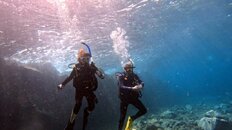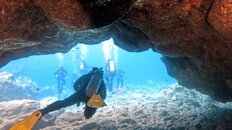Bartrinsic
New
I'm a crusty surfer, from Baja to San Francisco, and an avid Maui snorkeler, but I never had plans to dive. My 13 year old is determined to pursue marine biology--not an uncommon story, as we already met another young aspiring biologist on our first post-cert group dive at Mala Pier in Maui. Photos from 5 Caves Maui:


Our first cold water dives are coming up soon and we're kitting out for those now. Generally, I'd be curious how many others came to diving as facilitators and sponsors of younger family members. Specifically, I'd welcome any suggestions on how to support a young person's educational aspirations locally in SoCal. More specifically, if you're in a similar situation here in SoCal, maybe ping me.
Cheers,
Bartrinsic
PS: we play bass and drums/keys. If you need an après dive rhythm section, we are available.


Our first cold water dives are coming up soon and we're kitting out for those now. Generally, I'd be curious how many others came to diving as facilitators and sponsors of younger family members. Specifically, I'd welcome any suggestions on how to support a young person's educational aspirations locally in SoCal. More specifically, if you're in a similar situation here in SoCal, maybe ping me.
Cheers,
Bartrinsic
PS: we play bass and drums/keys. If you need an après dive rhythm section, we are available.




